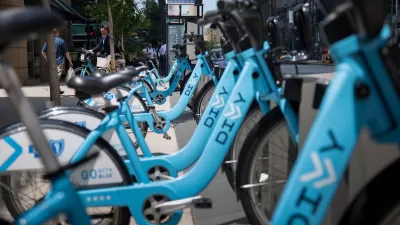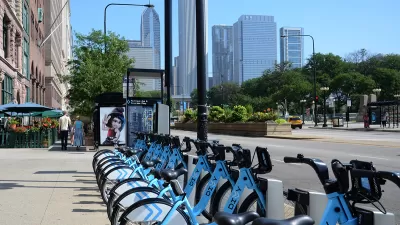In cities across America, municipal bike-share systems have had a hard time reaching low-income and minority populations. As Chicago plans its new system for next year's launch, the city is developing measures to broaden the demographics of cycling.
John Greenfield looks at how Chicago Department of Transportation (CDOT) deputy commissioner Scott Kubly, who helped launch Capital Bikeshare in Washington, D.C., and is managing Chicago’s new system, plans to overcome some of the challenges that have prevented bike-share systems in cities like Denver and Washington from reaching those most in need of cheap, efficient transportation.
"While bike sharing has great potential, the credit-card requirement [for membership] and other factors have been obstacles to attracting a diverse membership in other cities," notes Greenfield. "In Denver, where roughly fifty percent of residents are people of color, almost ninety percent of bike-share users are non-Hispanic whites, according to a member survey. 'Our demographic profile is nothing to be proud of, and we know that,' acknowledged Parry Burnap, head of Denver’s program, at a recent urban planning conference. 'We are mostly male, mostly white, mostly wealthy, mostly well educated.'”
So how does Kubly plan to improve access for a more diverse clientele? Strategies include providing training for inner-city youth to develop a workforce that "reflects the diversity of the city and help create a sense of ownership," working with community groups and churches to provide bike share access for people who don’t have credit cards, and distributing kiosk locations equitably.
“My number-one priority is getting a membership that reflects the diversity of the city,” Kubly assured attendees at a recent public meeting in Chicago's Bronzeville neighborhood. “Since we’re using public dollars, it’s important that the folks who are using the service reflect everybody in the community. It’s a challenge but we’re going to crack it.”
FULL STORY: Bike share, not white share: can Chicago’s program achieve diversity?

Planetizen Federal Action Tracker
A weekly monitor of how Trump’s orders and actions are impacting planners and planning in America.

Maui's Vacation Rental Debate Turns Ugly
Verbal attacks, misinformation campaigns and fistfights plague a high-stakes debate to convert thousands of vacation rentals into long-term housing.

San Francisco Suspends Traffic Calming Amidst Record Deaths
Citing “a challenging fiscal landscape,” the city will cease the program on the heels of 42 traffic deaths, including 24 pedestrians.

Amtrak Rolls Out New Orleans to Alabama “Mardi Gras” Train
The new service will operate morning and evening departures between Mobile and New Orleans.

The Subversive Car-Free Guide to Trump's Great American Road Trip
Car-free ways to access Chicagoland’s best tourist attractions.

San Antonio and Austin are Fusing Into one Massive Megaregion
The region spanning the two central Texas cities is growing fast, posing challenges for local infrastructure and water supplies.
Urban Design for Planners 1: Software Tools
This six-course series explores essential urban design concepts using open source software and equips planners with the tools they need to participate fully in the urban design process.
Planning for Universal Design
Learn the tools for implementing Universal Design in planning regulations.
Heyer Gruel & Associates PA
JM Goldson LLC
Custer County Colorado
City of Camden Redevelopment Agency
City of Astoria
Transportation Research & Education Center (TREC) at Portland State University
Jefferson Parish Government
Camden Redevelopment Agency
City of Claremont





























